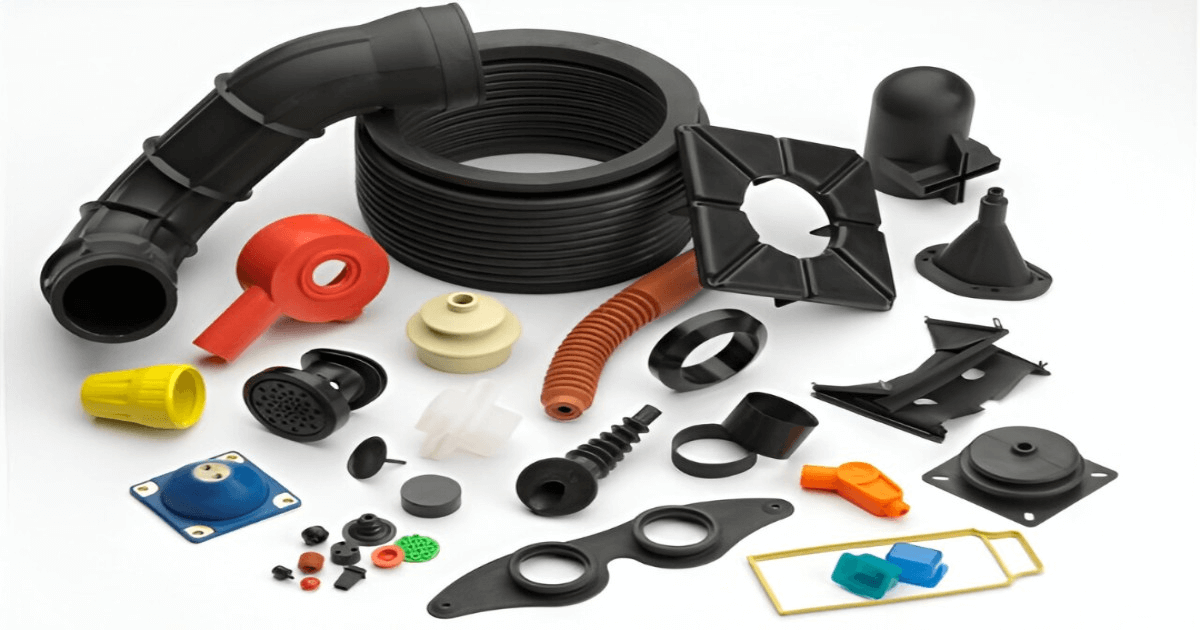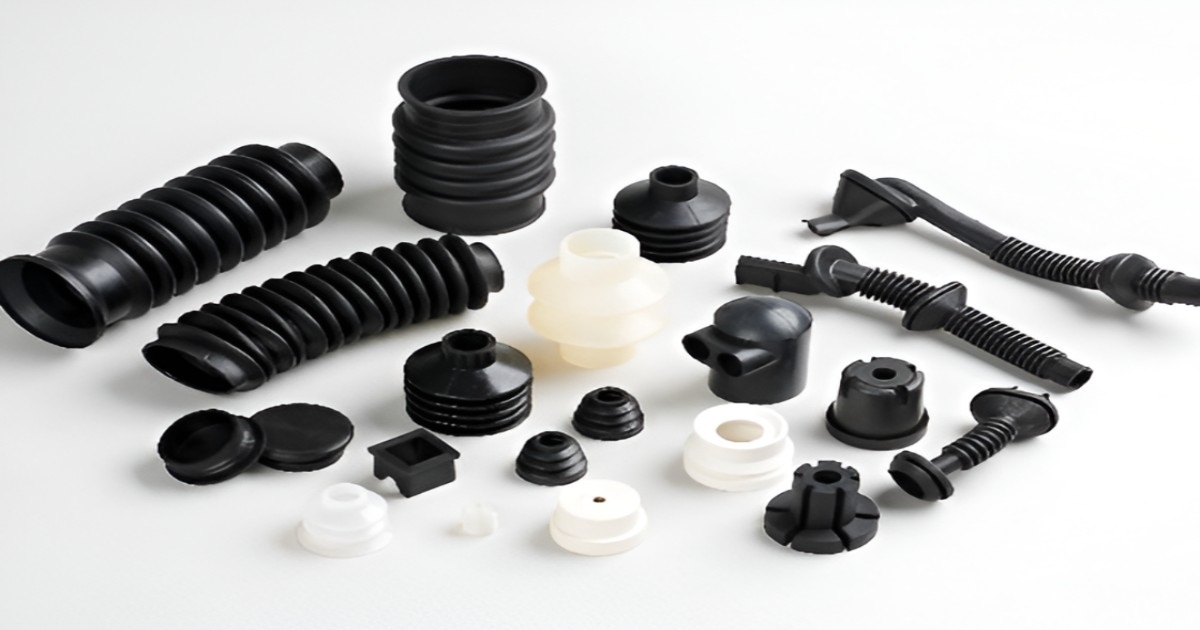Rubber Moulding Services
What is rubber moulding services?
Rubber moulding processes are foundational techniques in manufacturing for shaping various materials into intricate shapes and parts. Typically, these processes involve manipulating a material, often in a fluid or semi fluid state, within a mould cavity to achieve the desired form upon solidification or curing. Crucial to industries like automotive, aerospace, and consumer goods, moulding ensures precision and consistency in part production. Injection moulding, compression moulding, blow moulding, and rotational moulding are among the diverse methods tailored to specific materials and applications. These techniques are indispensable in modern manufacturing, facilitating the mass production of components with reliable quality and precise dimensional accuracy.
Rubber moulded products are made by shaping rubber into different shapes using moulds. In this manufacturing process, rubber materials like silicone rubber, polyurethane rubber, or natural rubber are either injected into moulds or compressed into them. These moulds are specially designed to give the final product its specific shape and texture. Rubber moulded products are valued for their flexibility, strength, and ability to replicate detailed textures from the mould’s surface. This method allows for creating wide variety of items, from car parts to industrial components, which are known for their toughness and precise design.
Key Aspects of rubber moulding services:
- Mold Design and Manufacturing: A high quality mold is crucial for precise and repeatable results. Advanced 3D CAD technology and tight tolerances ensure accuracy.
- Temperature, Pressure, and Time Control: Careful control of these parameters ensures optimal performance, strength, and durability in the final product.
- Post-Processing: Vulcanization enhances elasticity and strength, while trimming and finishing remove excess material and improve product aesthetics.
Why rubber moulding services is important?
Rubber moulding services play a crucial role in modern manufacturing by enabling the production of durable, precise, and application specific components that meet demanding operational requirements. From everyday consumer goods to advanced industrial equipment, moulded rubber parts are essential for sealing, insulation, vibration control, and protection. One of the key advantages of rubber moulding is its ability to ensure high precision and consistency, allowing manufacturers to produce complex shapes with tight tolerances. This ensures that every component fits and functions perfectly, maintaining uniform quality across large production runs.
These services also provide a high level of customization to suit specific industry needs. Different applications demand unique properties such as heat resistance, elasticity, or chemical compatibility, and rubber moulding allows for the creation of components that perform reliably in harsh environments, whether exposed to high temperatures, oil, or pressure. Moreover, moulded rubber components such as seals, gaskets, and dampers significantly enhance product performance and durability by preventing leaks, reducing vibration, and absorbing shocks thus extending the lifespan of machinery and improving operational efficiency.
What are the common challenges in rubber moulding services?
Rubber moulding is a highly specialized manufacturing process, but it also comes with a range of challenges that can affect product quality, efficiency, and overall production cost. Addressing these challenges requires the right combination of material expertise, precise mould design, and advanced manufacturing practices.
One of the primary challenges in rubber moulding is material selection. Each type of rubber compound behaves differently under heat and pressure, and choosing the wrong material can result in poor performance, dimensional inaccuracies, or premature failure. Manufacturers must carefully consider factors such as temperature resistance, chemical compatibility, elasticity, and hardness before selecting the appropriate compound for a specific application.

Related Services
- Product Design and Development: To transform client concepts into functional products using advanced 3D CAD and simulation tools, optimizing performance, manufacturability, and cost effectiveness.
- Tooling and Mould Design: To creates custom molds and dies using high accuracy CNC machines, ensuring consistent quality, dimensional precision, and long service life.
- Material Selection and Compound Formulation: To help clients choose the right rubber compound for their application, offering a range of materials and customized formulations to meet specific industrial needs.
- Metal to Rubber Bonding: For metal-to-rubber bonding services ensure strong adhesion between rubber and metal parts, ideal for applications like vibration mounts, gaskets, and shock absorbers.
- Prototyping and 3D Modeling: Offer rapid prototyping and 3D modeling to validate designs before mass production, reducing errors and accelerating time to market.
- Post-Moulding Finishing: Post moulding services include trimming, deflashing, surface coating, and inspection to enhance product aesthetics and functionality.
- Quality Inspection and Testing: We perform comprehensive testing to ensure each part meets international quality and performance standards
- Reverse Engineering Services: 3D Reverse engineering solutions use 3D scanning and digital 3D modeling to recreate or modify existing rubber components with enhanced precision and performance
The Process
Creating a rubber-moulded product involves a systematic approach that ensures the final product meets design specifications and quality standards. Here is a step-by-step process:
- Design and Prototype Development: We begin by conceptualizing the design of the rubber product. Develop detailed drawings using 3D CAD software to create a virtual model. We then build a prototype to test the design's functionality and feasibility.
- Mould Design: Design the mould structure, considering factors like parting lines, gating, and venting to ensure optimal manufacturing outcomes.
- Mould Fabrication: Construct the mould using precision manufacturing techniques such as CNC machining. Ensure the mould is robust and durable to withstand multiple production cycles.
- Preparing for Moulding: Prepare the chosen rubber material, ensuring it meets specification for the moulding process. Heat the mould if required to enhance material flow characteristics or curing properties.
- Moulding Process: Depending on the selected method i.e. Injection Moulding: Inject molten rubber into the mould cavity under high pressure. Compression Moulding: Place the rubber material in the mould cavity and compress it under heat and pressure. Transfer Moulding: Preheat rubber material in a chamber, then transfer it to a mould cavity for compression.
- Curing: Allow the rubber to cure inside the mould to attain its final shape and properties. Monitor temperature and pressure during curing to ensure consistency and quality.
- De-Moulding: Open the mould carefully once curing is complete. Remove the moulded rubber part, addressing any excess material or flash as needed.
- Post-Processing: Inspect the finished rubber part for quality assurance. Perform any necessary finishing operations such as trimming, drilling, or surface treatments to meet final specifications.
- Quality Control: Conduct rigorous checks to verify the product's dimensional accuracy, mechanical properties, and aesthetic standards. Address any deviations from requirements promptly.
- Packaging and Distribution: Package the moulded rubber products securely for distribution or subsequent assembly, ensuring they reach customers in optimal condition.

What are the applications of rubber moulding services across various industries?
Rubber moulding services have a wide range of applications across various industries, including:
- Automotive: Rubber moulding is essential in automotive applications such as seals, gaskets, hoses, mounts, and bushings. These components reduce vibration, prevent leakage, and withstand heat, oils, and weather conditions, ensuring vehicle reliability, comfort, and long-term performance across passenger and commercial vehicles.
- Aerospace: In aerospace, rubber moulded seals and gaskets ensure airtight sealing, vibration control, and resistance to extreme temperatures and pressure. High-precision rubber components support critical aircraft and spacecraft systems, maintaining safety, durability, and reliable performance under demanding operating conditions.
- Medical: Medical rubber moulding produces precision seals, gaskets, tubing, and components for devices and equipment. These parts meet biocompatibility and sterilization standards, ensuring leak-proof performance, hygiene, and reliability in healthcare applications while supporting patient safety and regulatory compliance.
- Industrial: Industrial rubber moulding supplies durable seals, gaskets, and vibration-damping components for machinery and infrastructure. These parts protect equipment from dust, moisture, and chemicals, reduce wear, and improve operational efficiency while minimizing downtime and maintenance requirements.
- Consumer Goods: Rubber moulded components are widely used in consumer goods, including appliances and electronics. They provide grip, sealing, insulation, and impact resistance, enhancing product functionality, safety, and durability while allowing flexible design and cost-effective mass production.
- Oil and Gas: Rubber moulding supports oil and gas operations with high-performance seals, gaskets, and O-rings designed for extreme pressure, temperature, and chemical exposure. These components ensure reliable sealing, safety, and operational efficiency in harsh onshore and offshore environments.
- Food and Beverage: Food-grade rubber moulding delivers hygienic seals, gaskets, and components for processing and packaging equipment. Manufactured from compliant materials, these parts resist contamination, support easy cleaning, and ensure safe, efficient operations in food and beverage production facilities.
- Pharmaceutical: Pharmaceutical rubber moulding provides precision seals, gaskets, and components for manufacturing and packaging equipment. Designed to meet strict regulatory and contamination-control standards, these parts withstand sterilization processes and help maintain product purity, safety, and consistent production quality.
Why choose RA Global?
At RA Global Tech Solutions, we combine technical expertise, advanced technology, and customer focused innovation to deliver high quality rubber moulded components tailored to diverse industrial applications. Our commitment to precision, reliability, and continuous improvement makes us a trusted name in the manufacturing industry.
- Affordable: Focusing on providing our products at good value where the benefits and usages are worth the price.
- Availability: Establish items based on the sizes, designs, and drawings that you specify.
- Quality: Focusing on superior quality of your product. Which includes durability, effectiveness, and craftsmanship.
- Innovation: We are committed to staying ahead through continuous research and development.
- Customer Focus: Our customers are at the heart of our business. We listen to their needs, provide personalized solutions, and ensure their satisfaction at every step.
- Reliability: You can count on us to deliver on time, every time.
- Trustworthiness: We prioritize transparency and integrity in our engagement.
Contact Us to learn more about how we can deliver the best possible results for your manufacturing.
Frequently Asked Questions
What are rubber moulded products?
Rubber moulded products are custom-made components created using rubber materials and moulding techniques to produce specific shapes and designs.
What materials are used in rubber moulding?
Common materials used in rubber moulding include natural rubber, synthetic rubber, and thermoplastic elastomers.
What are the benefits of rubber moulded products?
Rubber moulded products offer several benefits, including flexibility, durability, resistance to chemicals and abrasion, and the ability to withstand extreme temperatures.
What types of products can be made using rubber moulding?
Rubber moulding can produce a wide range of products, such as seals, gaskets, O-rings, bushings, mounts, and custom components.
Why Choose RA Global Tech Solutions for Rubber Moulded Products?
RA Global Tech Solutions offers expertise in rubber moulding with state of the art facilities, rigorous quality assurance, custom solutions, competitive pricing, and excellent customer service, ensuring high quality products that meet precise specifications.

